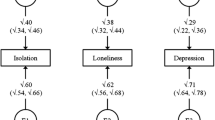Abstract
Work characteristics, including skill discretion and decision authority, explain most of the socioeconomic status gradient in well-being and depression in middle-aged British civil servants from the Whitehall II Study, London. Social support explained about one-third of the gradient, life events and material difficulties less than one-third. Socioeconomic status was measured by employment grade. Work characteristics were based on the Karasek model, social support was measured by the Close Persons Questionnaire, depression by the General Health Questionnaire and well-being by the Affect Balance Scale. Despite a small contribution from social selective factors measured by upward mobility, the psychosocial work environment explained most of the cross-sectional socioeconomic status gradient in well-being and depression.
Similar content being viewed by others
Author information
Authors and Affiliations
Additional information
Accepted: 25 February 1997
Rights and permissions
About this article
Cite this article
Stansfeld, S., Head, J. & Marmot, M. Explaining social class differences in depression and well-being. Soc Psychiatry Psychiatr Epidemiol 33, 1–9 (1997). https://doi.org/10.1007/s001270050014
Issue Date:
DOI: https://doi.org/10.1007/s001270050014




